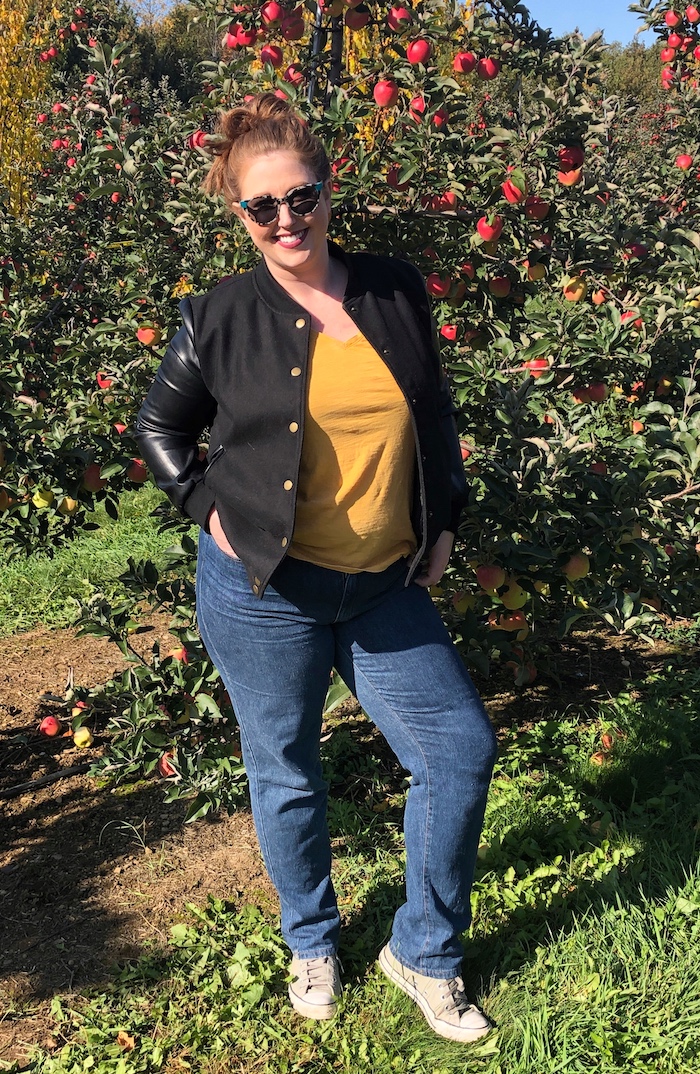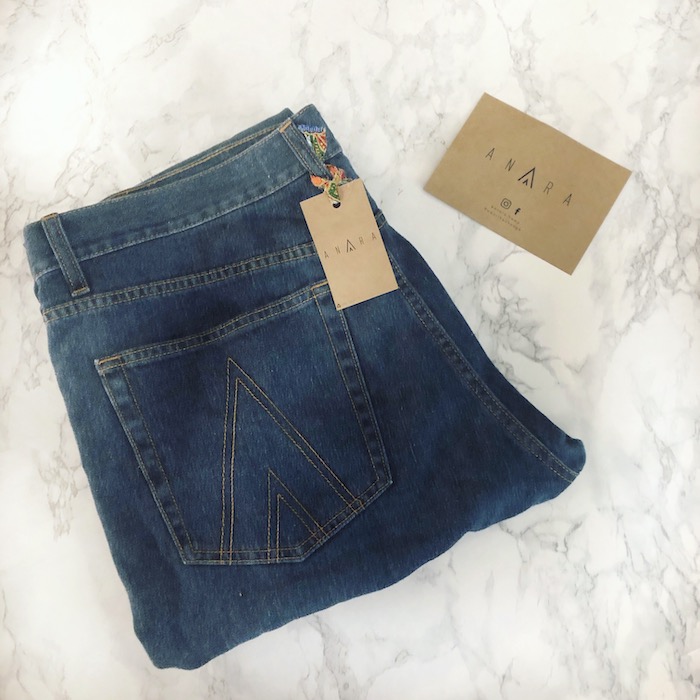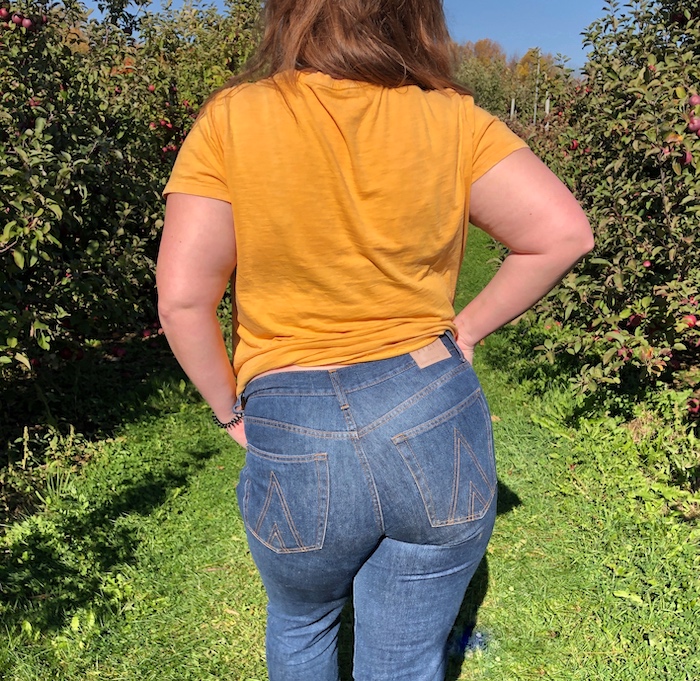For most people, finding a pair of jeans that fits comfortably and looks good is a pipe dream. Or, if you’re like me, you find a pair that you like, and then – rrrrrrip! – your thighs are suddenly much more visible than you intended! All that is about to change, because Anara is here to save the day (and the environment) with their revolutionary hemp denim.

{ Feel-Good Jeans: Anara Hemp’s Breakthrough }
Disclaimer: A pair of Anara denim was provided to me at no cost for editorial consideration. All opinions are my own.
Like most plus-size women, my denim choices for the past few years have been of the jegging variety: something with enough stretch to hug my curves and allow me to sit and move comfortably, but still “denimy” enough to pass as actual pants. The problem with jeans like these, however, is that the stretchy fabric isn’t especially durable, meaning I’m often having to use iron-on patches to disguise rips or places where the fabric has worn thin. In fact, I’ve found myself purchasing a new pair of jeans almost every year, and I’m definitely not alone.
Denim Blues
Jeans have become an absolute staple of every wardrobe. They can be dressed up or down easily, so you can find a pair of jeans for almost every occasion. Since finding the right pair of jeans can be difficult for most people, however, clothing companies have responded by producing more and more styles and options. This makes for a wider selection of jeans, but also makes for a lot of waste and strain on the resources (natural and human) that go towards making all this denim.
With high demand, companies need to produce clothing quickly. This – and the desire to have goods be as inexpensive as possible – means that the quality decreases, and clothing doesn’t last. In fact, according to a recent CBC Marketplace investigation, North Americans dump 12 million tons of textiles in landfills each year. And all that clothing creates massive amounts of greenhouse gases as it decomposes. In fact, one pair of jeans decomposing emits as much carbon dioxide as driving a car 115 kilometers!
So: is there a way to be an ecologically responsible citizen without giving up jeans entirely?
Absolutely! The answer, it turns out, is hemp.
Wait – What About Cotton?
Most denim is made of cotton, combined with some other fibres. Cotton is a crop that uses an extraordinary amount of water. In fact, one pair of jeans requires approximately 9500 litres of water to produce, when you consider the water required to grow and maintain the cotton, and the water used in the denim manufacturing process. That’s 37 times more water than the average Canadian uses in their household in a year!
Cotton’s impact on the world doesn’t end with water. Even with only 2% of the planet devoted to cotton crops, almost 25% of the world’s pesticides are used to maintain those crops! And once they run off of the plants, all of those chemicals end up back in the soil and water systems, further impacting animal and plant life.

Hemp to the Rescue
In order to create the most sustainable pair of jeans possible, then, Anara’s founders turned to hemp. In fact, Anara is the first company in the world to use over 50% hemp fibres in their denim! Why hemp, you ask? Well, because hemp is kind of a miracle plant.
Hemp uses 50% less water to grow than cotton, and replenishes 60% of nutrients back to the soil it grows in. It requires no pesticides or herbicides to grow, and the same size plot of land can grow 250% more hemp than cotton! So you’re using half as much water, and no chemicals, to create over twice as much fabric as you would with regular cotton denim.
Add on to that the fact that hemp is naturally moisture wicking and anti-bacterial, and you’ll see why hemp is a perfect fit for denim. (Seriously: you only need to wash these jeans 2-3 times A YEAR. Spot-treat any stains, and throw them in the freezer if they’re getting a bit fragrant.)
And those too-thin, rip-after-a-few-wears fabrics I was talking about earlier? Hemp leaves them in its dust. Hemp denim is four times more durable than all cotton denim!
If you’ve ever held a hemp rope, however, you know that it can be rough. So how does Anara make jeans that use all the benefits of hemp, but are still comfortable? Well, the other fabric used in Anara denim is organic and sustainably farmed cotton. And that cotton could not be further away from the standard stuff we discussed earlier. Organic fibres use significantly less energy and water for production, and emit less than half the greenhouse gases that standard farming practices do!
So by combining strong and sustainable hemp with soft and ethically farmed cotton, Anara has created a pair of denim that is comfy, durable, and will allow you to be a part of positive change in the fashion industry.

Ok, But Are They Cute?
The short answer to this question is yes! I absolutely love my Anara jeans, and wear them several times a week. They’re snug at first, but relax and form to your body after a a few wears. While they’re not a stretchy fabric, I can comfortably crouch, sit, walk, and bend in them, without being scared that I’m going to rip the seams. (No small feat for a non-jegging jean!)
Anara’s Legacy denim is a mid-rise cigarette leg. They hit around the belly button, and the leg is cut straight from knee to ankle for a slim fit. The jeans look good with the cuff rolled or down, so I can wear them with sneakers for a more casual look, or with flats or heels to dress them up a bit.
Perhaps the best part is that they form so well to my body that I’m not constantly hiking them up or adjusting over my hips and belly. They just… fit. Better than any pair of jeans I’ve ever had!
While a pair of Anara jeans isn’t inexpensive ($195), the price reflects the high quality and durability of the denim. These are investment jeans, created as an antithesis to planet-harming, human-endangering fast fashion. As Anara co-founder Jamieson told me, “We never want to do more good for ourselves than we do for the world.”
So until skirt weather returns, I’ll be wearing my Anara hemp denim. I love knowing that I’ve got a pair of jeans that will last for years, made by an ecologically responsible company that ensures that every person in the supply chain is paid fairly and has good working conditions. Plus my butt looks mad cute. 🙂

2 thoughts on “Feel-Good Jeans: Anara Hemp’s Breakthrough”